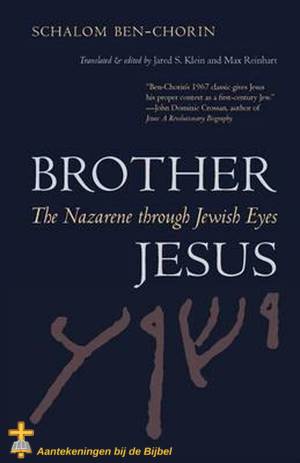
Aantekeningen bij de Bijbel
Vragen, overdenkingen en achtergronden over de Bijbel,
welke resulteren in allerlei aantekeningen.
| SV | En ik, broeders, kon tot u niet spreken als tot geestelijken, maar als tot vleselijken, als tot jonge kinderen in Christus. |
| Steph | και εγω αδελφοι ουκ ηδυνηθην λαλησαι υμιν ως πνευματικοις αλλ ως σαρκικοισ ως νηπιοις εν χριστω
|
| Trans. | kai egō adelphoi ouk ēdynēthēn lalēsai ymin ōs pneumatikois all ōs sarkikois̱ ōs nēpiois en christō |
Algemeen
Zie ook: Fundament (Geestelijk), Jezus Christus
Overzicht
- Vermaning tegen verdeeldheid
- Christus het fundament des heils
Aantekeningen
En ik, broeders, kon tot u niet spreken als tot geestelijken, maar als tot vleselijken, als tot jonge kinderen in Christus.
- Clement, Stromata 5.4 - The philosophers did not exert themselves in contemning the appearance of the Lord. It therefore follows that it is the opinion of the wise among the Jews which the apostle inveighs against it. Wherefore he adds, “But we preach, as it is written, what eye hath not seen, and ear hath not heard, and hath not entered into the heart of man, what God hath prepared for them that love Him. For God hath revealed it to us by the Spirit. For the Spirit searcheth all things, even the deep things of God.” For he recognises the spiritual man and the Gnostic as the disciple of the Holy Spirit dispensed by God, which is the mind of Christ. “But the natural man receiveth not the things of the Spirit, for they are foolishness to him.” Now the apostle, in contradistinction to gnostic perfection, calls the common faith the foundation, and sometimes milk, writing on this wise: “Brethren, I could not speak to you as to spiritual, but as to carnal, to babes in Christ. I have fed you with milk, not with meat: for ye were not able. Neither yet are ye now able. For ye are yet carnal: for whereas there is among you envy and strife, are ye not carnal, and walk as men?” Which things are the choice of those men who are sinners. But those who abstain from these things give their thoughts to divine things, and partake of gnostic food. “According to the grace,” it is said, “given to me as a wise master builder, I have laid the foundation. And another buildeth on it gold and silver, precious stones.” Such is the gnostic superstructure on the foundation of faith in Christ Jesus. But “the stubble, and the wood, and the hay,” are the additions of heresies. “But the fire shall try every man’s work, of what sort it is.” In allusion to the gnostic edifice also in the Epistle to the Romans, he says, “For I desire to see you, that I may impart unto you a spiritual gift, that ye may be established.” It was impossible that gifts of this sort could be written without disguise.
- Clement, Stromata 5.10 - Rightly then, Plato, in the Epistles, treating of God, says: “We must speak in enigmas that should the tablet come by any mischance on its leaves either by sea or land, he who reads may remain ignorant.” For the God of the universe, who is above all speech, all conception, all thought, can never be committed to writing, being inexpressible even by His own power. And this too Plato showed, by saying: “Considering, then, these things, take care lest some time or other you repent on account of the present things, departing in a manner unworthy. The greatest safeguard is not to write, but learn; for it is utterly impossible that what is written will not vanish.”
Akin to this is what the holy Apostle Paul says, preserving the prophetic and truly ancient secret from which the teachings that were good were derived by the Greeks: “Howbeit we speak wisdom among them who are perfect; but not the wisdom of this world, or of the princes of this world, that come to nought; but we speak the wisdom of God hidden in a mystery.” Then proceeding, he thus inculcates the caution against the divulging of his words to the multitude in the following terms: “And I, brethren, could not speak to you as to spiritual, but as to carnal, even to babes in Christ. I have fed you with milk, not with meat: for ye were not yet able; neither are ye now able. For ye are yet carnal.”
If, then, “the milk” is said by the apostle to belong to the babes, and “meat” to be the food of the full-grown, milk will be understood to be catechetical instruction—the first food, as it were, of the soul. And meat is the mystic contemplation; for this is the flesh and the blood of the Word, that is, the comprehension of the divine power and essence. “Taste and see that the Lord is Christ,” it is said. For so He imparts of Himself to those who partake of such food in a more spiritual manner; when now the soul nourishes itself, according to the truth-loving Plato. For the knowledge of the divine essence is the meat and drink of the divine Word. Wherefore also Plato says, in the second book of the Republic, “It is those that sacrifice not a sow, but some great and difficult sacrifice,” who ought to inquire respecting God. And the apostle writes, “Christ our passover was sacrificed for us”;—a sacrifice hard to procure, in truth, the Son of God consecrated for us.
- Clement, Stromata 5 26 § 1
- Clement of Alexandria, Instructor 1.6 - But the childhood which is in Christ is maturity, as compared with the law. Having reached this point, we must defend our childhood. And we have still to explain what is said by the apostle: I have fed you with milk (as children in Christ), not with meat; for you were not able, neither yet are you now able. 1 Corinthians 3:2 For it does not appear to me that the expression is to be taken in a Jewish sense; for I shall oppose to it also that Scripture, I will bring you into that good land which flows with milk and honey. Exodus 3:8 A very great difficulty arises in reference to the comparison of these Scriptures, when we consider. For if the infancy which is characterized by the milk is the beginning of faith in Christ, then it is disparaged as childish and imperfect. How is the rest that comes after the meat, the rest of the man who is perfect and endowed with knowledge, again distinguished by infant milk? Does not this, as explaining a parable, mean something like this, and is not the expression to be read somewhat to the following effect: I have fed you with milk in Christ; and after a slight stop, let us add, as children, that by separating the words in reading we may make out some such sense as this: I have instructed you in Christ with simple, true, and natural nourishment—namely, that which is spiritual: for such is the nourishingsubstance of milk swelling out from breasts of love. So that the whole matter may be conceived thus: As nurses nourish new-born children on milk, so do I also by the Word, the milk of Christ, instilling into you spiritual nutriment.
Thus, then, the milk which is perfect is perfect nourishment, and brings to that consummation which cannot cease. Wherefore also the same milk and honey were promised in the rest. Rightly, therefore, the Lord again promises milk to the righteous, that the Word may be clearly shown to be both, theAlpha and Omega, beginning and end; Revelation 1:8 the Word being figuratively represented as milk. Something like this Homer oracularly declares against his will, when he calls righteous men milk-fed (γαλακτοφάγοι). So also may we take the Scripture: And I, brethren, could not speak unto you as unto spiritual, but as unto carnal, even as unto babes in Christ; 1 Corinthians 3:1 so that the carnal may be understood as those recently instructed, and still babes in Christ. For he called those who had already believed on the Holy Spirit spiritual, and those newly instructed and not yet purified carnal; whom with justice he calls still carnal, as minding equally with the heathen the things of the flesh: For whereas there is among you envy and strife, are you not carnal, and walk as men?1 Corinthians 3:3 Wherefore also I have given you milk to drink, he says; meaning, I have instilled into you the knowledge which, from instruction, nourishes up to life eternal. But the expression, I have given you to drink (ἐπότισα), is the symbol of perfect appropriation. For those who are full-grown are said to drink, babes to suck.
- Dialogues of Adamantius
- Tertullian Prescription 27 § 4
- Epiphanius Panarion 73 32 § 2
- Ignatius Trallians 5 § 1
Vertaalnotities
 Zie hier voor een verklaring van de gebruikte coderingen.
Zie hier voor een verklaring van de gebruikte coderingen.
Zie hier over het gebruik van de interlineair.
πνευματικοις
tot geestelijken
σαρκικοις
tot vleselijken
νηπιοις
tot jonge kinderen
|
En ik, broeders, kon tot u niet spreken als tot geestelijken, maar als tot vleselijken, als tot jonge kinderen in Christus.
- ἀδελφός G80 "broeder"; Uit aanzienlijk buiten-Bijbels bewijs blijkt dat het meervoud ἀδελφοί ook meer algemeen gebruikt kan worden voor "broeders en zusters" of "medechristenen" (BDAG 18 s.v. ἀδελφός 1; LSJ, ἀδελφός).
____
- κἀγώ WH; καὶ ἐγώ Byz ς
- λαλῆσαι ὑμῖν ς WH; ὑμῖν λαλῆσαι Byz
- σαρκίνοις WH; σαρκίκοις Byz ς
- Lacune in minuscule 122, δ 258 (C.R. Gregory, Textkritik des Neuen Testamentes, p. 153): Hand. 1:1-14; 21:15-22:28; Rom. 1:1-7:13; 1 Cor. 2:7-14:23; 1 Joh. 4:20-Judas einde;
Koop nu
Commentaar
 Zie de huisregels welk commentaar wordt opgenomen!
Zie de huisregels welk commentaar wordt opgenomen!

![]() Zie hier voor een verklaring van de gebruikte coderingen.
Zie hier voor een verklaring van de gebruikte coderingen.




![]() Zie de huisregels welk commentaar wordt opgenomen!
Zie de huisregels welk commentaar wordt opgenomen!